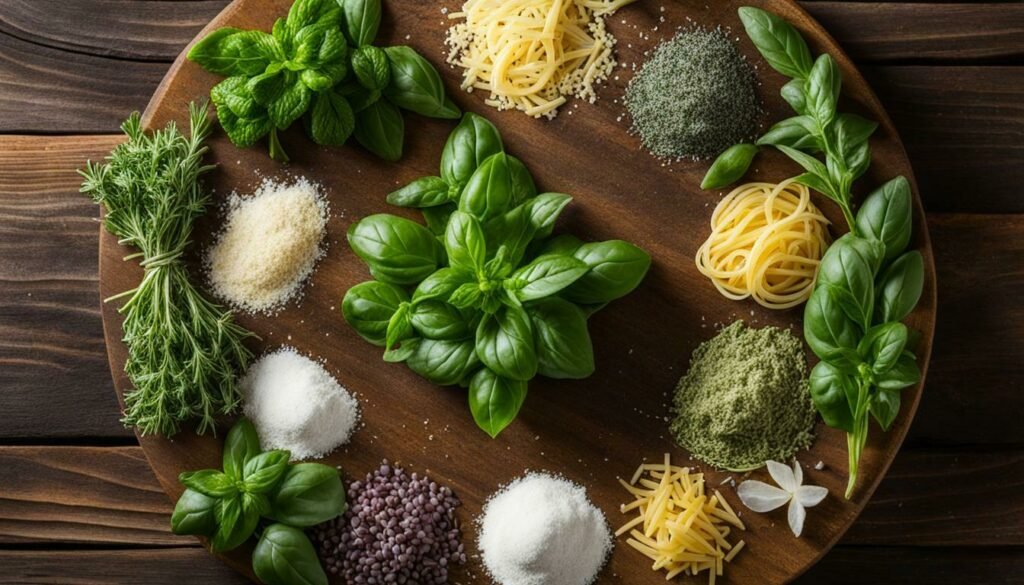Best Herbs for Pasta
When it comes to pasta, selecting the right herbs can make all the difference in elevating your dishes to new levels of deliciousness. The flavors and benefits of herbs bring depth and freshness to your pasta creations, enhancing both taste and aroma. In this section, we will explore the best herbs for pasta and how they can transform your cooking. From the popular choices of basil, thyme, rosemary, parsley, oregano, and sage, to lesser-known herbs, we will uncover the secrets to creating irresistible pasta dishes.
Key Takeaways:
- Choosing the right herbs for your pasta dishes can elevate flavors and aroma.
- Basil, thyme, rosemary, parsley, oregano, and sage are commonly used herbs in pasta recipes.
- Each herb possesses unique tastes and benefits that can enhance your dishes.
- Growing your own herbs provides fresh ingredients and adds an extra layer of flavor.
- Experimenting with different herbs can bring freshness and depth to your pasta creations.
Commonly Used Herbs for Pasta
Basil, thyme, rosemary, parsley, oregano, and sage are among the most popular herbs used in pasta dishes, each offering its own distinct flavor profile. These herbs can elevate your dishes and add a unique touch to your cooking. Let’s take a closer look at each of these herbs and how they can enhance your pasta creations.
Basil: Known for its sweet and pungent taste, basil brings a burst of freshness to pasta dishes. Whether it’s the classic pairing with tomatoes in a Caprese pasta or the fragrant aroma of a basil pesto sauce, this herb is a staple in Italian cuisine.
Thyme: With its aromatic and minty flavor, thyme adds depth and complexity to pasta dishes. It pairs well with a variety of ingredients, from roasted vegetables to rich tomato sauces. A sprinkle of thyme can take your pasta dish from ordinary to extraordinary.
Rosemary: Offering a lemon-pine flavor, rosemary adds a delightful earthiness to pasta dishes. Its robust flavor complements roasted vegetables, grilled meats, and creamy sauces. A little goes a long way with rosemary, as its strong flavor can easily dominate a dish.
Parsley: While parsley may be commonly used as a garnish, it also brings a mild bitter taste to pasta dishes. Its bright green leaves add a pop of freshness and can be used to enhance the flavors of both creamy and light pasta sauces.
Oregano: With its slightly bitter and pungent flavor, oregano is a staple in Italian cuisine. It pairs well with tomato-based sauces, adding a robust and herbaceous taste. Sprinkle some oregano on your pasta dish to bring out its Mediterranean flavors.
Sage: Offering a sweet and somewhat bitter taste, sage adds a unique flavor to pasta dishes. Its warm and earthy notes pair well with butter-based sauces, pumpkin, and butternut squash. A sprinkle of sage can elevate your pasta dish and make it feel like a gourmet creation.
| Herb | Flavor Profile |
|---|---|
| Basil | Sweet and pungent |
| Thyme | Aromatic and minty |
| Rosemary | Lemon-pine |
| Parsley | Mild bitter |
| Oregano | Slightly bitter and pungent |
| Sage | Sweet and somewhat bitter |
Now that you know about these commonly used herbs, you can experiment with them in your pasta dishes. Whether you choose to use them individually or combine them to create unique flavor combinations, these herbs will add freshness and depth to your cooking. So go ahead, explore the world of herbs for pasta and elevate your dishes to new heights!
Related Herbs and Flavor Pairings
- Dill: Fresh and tangy, pairs well with seafood pasta dishes.
- Chives: Mild and onion-like flavor, perfect for creamy pasta sauces.
- Tarragon: Anise-like flavor, complements chicken and mushroom pasta recipes.
- Lemon Balm: Citrusy and minty, adds brightness to pasta salads.
- Mint: Refreshing and cooling, great for pairing with peas and lamb in pasta dishes.
- Marjoram: Mild and sweet, enhances the flavors of tomato-based pasta sauces.
- Cilantro: Fresh and vibrant, adds a unique twist to Mexican-inspired pasta dishes.
- Bay Leaves: Earthy and aromatic, infuses a subtle flavor into long-cooked pasta sauces.
- Chervil: Delicate and parsley-like, ideal for enhancing cream-based pasta sauces.
- Rosemary: Aromatic and lemon-pine, pairs well with roasted vegetables and meats in pasta dishes.
- Greek Oregano: Intense and slightly peppery, adds Mediterranean flair to pasta dishes.
- Thai Basil: Spicy and sweet, perfect for adding a Thai twist to pasta recipes.
- Lavender: Floral and fragrant, can be used sparingly to add an elegant touch to pasta dishes.
With so many herbs to choose from, the possibilities are endless. Let your creativity guide you as you explore the world of herbs for pasta and create delicious and memorable dishes!
Basil adds a delightful sweetness to pasta dishes, while thyme brings an aromatic and refreshing taste. Rosemary, with its distinct lemon-pine flavor, adds a unique dimension to your culinary creations. Meanwhile, parsley offers a mild bitter taste that pairs well with a variety of ingredients, and oregano brings a slightly bitter and pungent flavor that can take your pasta dishes to the next level.
But it doesn’t stop there! Sage, with its sweet and somewhat bitter taste, is another herb that can elevate your pasta dishes. These herbs not only enhance the flavor of your pasta but also offer numerous health benefits. Basil, for example, is rich in antioxidants and has antimicrobial properties. Thyme is known for its antibacterial and antifungal properties, while rosemary contains anti-inflammatory compounds.
Flavors and Benefits of Herbs for Pasta
| Herb | Flavor | Benefits |
|---|---|---|
| Basil | Sweet, pungent | Rich in antioxidants, antimicrobial properties |
| Thyme | Aromatic, minty | Antibacterial, antifungal properties |
| Rosemary | Lemon-pine | Contains anti-inflammatory compounds |
| Parsley | Mild bitter | High in vitamin C and K, supports bone health |
| Oregano | Slightly bitter, pungent | Antioxidant, antimicrobial properties |
| Sage | Sweet, somewhat bitter | Improves memory, reduces inflammation |
By incorporating these herbs into your pasta dishes, you not only add depth and complexity to the flavor, but also reap the benefits of their nutritional properties. So next time you’re in the kitchen preparing a pasta dish, don’t forget to reach for these flavorful herbs and elevate your culinary experience.
Growing your own culinary herbs is not only rewarding but also a fantastic way to have a constant supply of fresh ingredients for your pasta creations. Whether you have a spacious garden or a small balcony, herbs can thrive in various environments and require minimal effort to maintain. Imagine the convenience of stepping outside and plucking a handful of fresh basil or thyme to add a burst of flavor to your pasta dishes.
When it comes to growing herbs for pasta, you have several options. You can start from seed, purchase seedlings from a local nursery, or even propagate herbs from cuttings. Some popular herbs that are easy to grow and perfect for pasta include basil, parsley, oregano, and thyme. These herbs are known for their robust flavors and versatility in various cuisines.
To ensure that your herbs flourish, provide them with adequate sunlight, well-draining soil, and regular watering. Most herbs prefer full sun, so find a sunny spot in your garden or place your potted herbs in a location that receives at least six hours of direct sunlight each day. Water your herbs regularly, but avoid overwatering, as herbs generally prefer slightly dry soil. Additionally, keep an eye out for pests and diseases, and address any issues promptly to keep your herbs healthy and thriving.
| Herb | Sunlight Requirement | Watering Needs | Growth Time |
|---|---|---|---|
| Basil | Full sun | Regular watering | 60-90 days |
| Parsley | Partial shade to full sun | Regular watering | 70-90 days |
| Oregano | Full sun | Low watering | 90-120 days |
| Thyme | Full sun | Low watering | 60-90 days |
With your own herb garden, you can experiment with different flavors and combinations to elevate your pasta dishes. From fragrant basil pesto to aromatic thyme-infused sauces, the possibilities are endless. So why not embark on a culinary adventure and start growing your own herbs for pasta today?
Note: The growth time mentioned above is an approximate estimate and may vary depending on various factors such as species, climate, and growing conditions.
Popular Herbs for Cooking
In addition to the commonly used herbs for pasta, there are numerous other culinary herbs that can add freshness and depth to your pasta dishes. These herbs offer a wide range of flavors and aromas that can elevate your cooking to the next level.
One popular herb is dill, known for its delicate and slightly tangy flavor. It pairs well with creamy pasta sauces and seafood dishes. Chives, with their mild onion-like taste, are perfect for adding a subtle kick to your pasta salads or creamy sauces.
If you’re looking to add a hint of citrus to your pasta, consider using lemon balm. This herb has a refreshing lemony scent and taste, making it ideal for light and summery pasta dishes.
Mint, with its cooling and aromatic flavor, can liven up your pasta with a touch of freshness. Try adding it to your pesto sauce or incorporating it into a refreshing pasta salad.
| Herb | Flavor | Uses |
|---|---|---|
| Basil | Sweet and pungent | Pesto, tomato-based sauces |
| Parsley | Mildly bitter | Garnish, flavor enhancer |
| Thyme | Aromatic and minty | Roasted vegetables, creamy sauces |
| Rosemary | Lemon-pine | Roasted meats, potato dishes |
| Oregano | Slightly bitter and pungent | Tomato-based sauces, pizzas |
| Sage | Sweet and somewhat bitter | Butter sauces, stuffing |
Exploring these lesser-known herbs will allow you to experiment with different flavors and create unique pasta dishes. Whether you want to add a subtle hint of citrus or a burst of freshness, incorporating these herbs into your recipes will undoubtedly elevate your culinary creations.
Conclusion
The right selection of herbs has the power to take your pasta dishes from ordinary to extraordinary, adding a burst of flavor and enhancing your overall cooking experience. By incorporating the best herbs for pasta, such as basil, thyme, rosemary, parsley, oregano, and sage, you can elevate the taste profile of your dishes and create culinary masterpieces.
Basil, with its sweet and pungent taste, adds a refreshing twist to your pasta creations. Thyme brings an aromatic and minty flavor, infusing your dishes with a delightful freshness. For a hint of lemon-pine goodness, rosemary is the perfect choice.
Meanwhile, parsley lends a mild bitter taste that complements a range of flavors, and oregano provides a slightly bitter and pungent flavor that pairs well with tomato-based sauces. Lastly, sage offers a unique blend of sweetness and bitterness, giving your pasta dishes a complex and satisfying taste.
When it comes to cooking with herbs, the possibilities are endless. The popular herbs for cooking, including basil, parsley, oregano, thyme, sage, dill, chives, tarragon, lemon balm, mint, marjoram, cilantro, bay leaves, chervil, rosemary, Greek oregano, Thai basil, and lavender, can be used in various combinations to add freshness and depth to your pasta dishes.
Not only do these herbs enhance the flavor of your dishes, but growing your own culinary herbs also allows you to have a ready supply of fresh ingredients at your fingertips. Whether you have a small herb garden or a few potted plants on your windowsill, cultivating your own herbs for pasta is a gratifying and sustainable way to elevate your cooking.
So, why settle for plain, uninspiring pasta when you can transform it into a gourmet delight? The right selection of herbs can turn a simple dish into a culinary masterpiece, tantalizing your taste buds and impressing your guests. Experiment with different herbs, explore unique flavor combinations, and watch as your pasta dishes become truly extraordinary.
FAQ
What are the best herbs for pasta?
Some of the best herbs for pasta include basil, thyme, rosemary, parsley, oregano, and sage. They each have unique flavors that can elevate your pasta dishes.
What does basil taste like?
Basil has a sweet and pungent taste that adds freshness to pasta dishes.
What flavor does thyme add to pasta?
Thyme has an aromatic and minty flavor that can enhance the taste of pasta dishes.
How does rosemary contribute to pasta flavors?
Rosemary adds a lemon-pine flavor that can bring a unique twist to your pasta dishes.
What taste does parsley bring to pasta?
Parsley brings a mild bitter taste to pasta dishes, adding a hint of freshness.
What is the flavor of oregano in pasta?
Oregano gives a slightly bitter and pungent flavor to pasta dishes, adding depth to the overall taste.
What does sage taste like in pasta?
Sage offers a sweet and somewhat bitter taste that can add a unique flavor profile to pasta dishes.
What are some popular herbs for cooking?
Popular herbs for cooking include basil, parsley, oregano, thyme, sage, dill, chives, tarragon, lemon balm, mint, marjoram, cilantro, bay leaves, chervil, rosemary, Greek oregano, Thai basil, and lavender.
Why is growing your own herbs beneficial?
Growing your own herbs allows you to have fresh ingredients on hand, enhancing the flavor of your pasta dishes and providing a sense of satisfaction and connection with your food.
How can I successfully grow herbs at home?
To successfully grow herbs at home, you should provide them with well-drained soil, ample sunlight, and regular watering. It’s also important to choose the right herbs for your climate and ensure proper spacing and pruning.
How can experimenting with different herbs enhance my pasta dishes?
Experimenting with different herbs can add freshness and depth to your pasta dishes. Each herb brings its own unique flavor profile, allowing you to create exciting and diverse culinary experiences.





